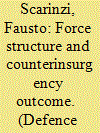|
|
|
Sort Order |
|
|
|
Items / Page
|
|
|
|
|
|
|
| Srl | Item |
| 1 |
ID:
178640


|
|
|
|
|
| Summary/Abstract |
This article examines the Cyprus Emergency (1955–1959) to test the force structure thesis. According to the thesis, armies that deploy more manpower per armored vehicle would succeed in counterinsurgency because they could win people’s trust, secure intelligence from civilians, and use force selectively. Using the congruence method of within-case analysis, I show that the causal process and logic of the force structure argument are not confirmed in the favorable case of Cyprus. Despite its preference for infantry and police units, the British garrison failed to win over the people and persuade civilians to share information about the insurgent; besides, Britain’s intelligence breakthroughs and selective violence did not result from the logic of the force structure thesis, nor did the conflict end as the argument would predict. Political conditions, instead, played a greater role. Ultimately, the case of Cyprus warns against the reassuring belief, inherent in the force structure thesis, that military organizational adjustments in favor of manpower can pave the way to victory against irregular opponents.
|
|
|
|
|
|
|
|
|
|
|
|
|
|
|
|
| 2 |
ID:
087452


|
|
|
|
|
| Publication |
2009.
|
| Summary/Abstract |
Terror threats and fear of ethnic and religious outbursts, combined with the aspirations of governments to better integrate immigrants into society, have led a growing number of Western states to adopt the practice of citizenship tests as a prerequisite for full citizenship. These tests require the immigrant, usually of non-Western origin, to demonstrate advanced language skills as well as comprehensive civic and cultural knowledge of the host society. While existing literature focuses either on internal inconsistencies within civic integration policies or on the models of citizenship reflected in the exams, the present article offers a critical and power-centered approach to the subject. Using a Foucauldian perspective, we analyze the tests as a sign of authority, a technology of naturalizing authority, and a disciplinary tool. This study joins a growing body of literature on the concept of governmentality, putting the spotlight on the `microphysics of power', specifically at borders and liminal points where the state's presence is prominent.
|
|
|
|
|
|
|
|
|
|
|
|
|
|
|
|
| 3 |
ID:
165198


|
|
|
|
|
| Summary/Abstract |
Recent historical research exposed the myth of self-restraint as the distinctive feature of British counterinsurgency during decolonisation. This article shows that the revisionist historiography of British counterinsurgency has important, but unnoticed, implications for political scientists. Specifically, historical scholarship challenges the predictions and causal mechanisms of the main social scientific theses of civilian victimisation in counterinsurgency. Using revisionist historians’ works as a source of data, I test those theses against Britain’s decolonisation conflicts. I find that they do not pass the test convincingly. I conclude that political scientists should be more willing to explore the theoretical implications of new historical evidence on counterinsurgency campaigns.
|
|
|
|
|
|
|
|
|
|
|
|
|
|
|
|
|
|
|
|
|